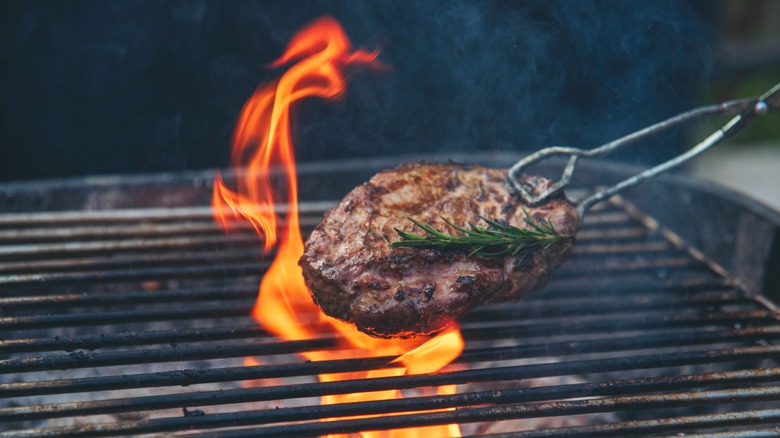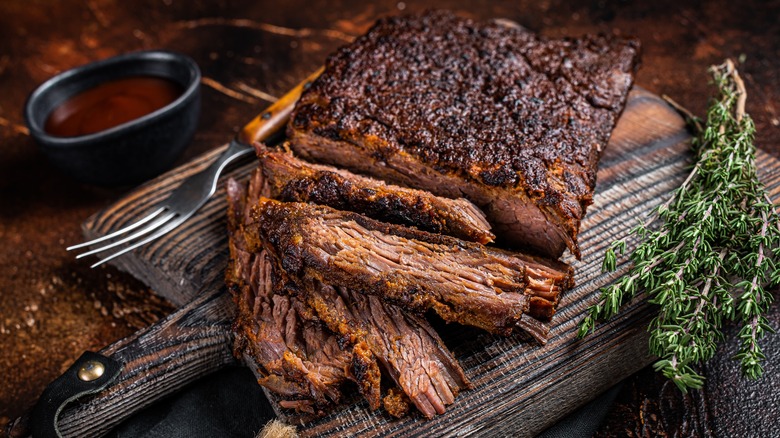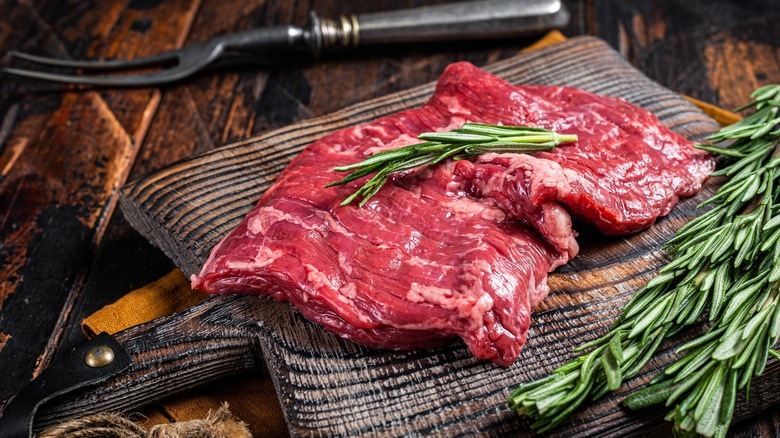No Charcoal Grill? No Problem: Use This Meat Seasoning To Replicate That Smoky Taste
Whether you're making a classic all-American cheeseburger or a tender steak, nothing compares to grilling over charcoal. The crisp-on-the-outside, juicy-as-anything-on-the-inside texture of the meat paired with an earthy, smoky flavor profile is as delicious as it is hard to replicate. Sadly, not everyone has the outdoor space for a charcoal barbecue, and you definitely shouldn't be grilling in your garage, meaning that this cooking method is not always an option. But is it impossible to achieve the same smokiness and complexity on, say, a stovetop? To find out more, Food Republic spoke to Samuel-Drake Jones, executive chef of Hudson VU in New York City. The expert confirmed that there's a whole range of charcoal-infused seasonings out there to give your meat an instant infusion of that flavor, no grill needed.
"Charcoal-infused spice blends use activated charcoal with other ingredients like smoked salts, smoked chilis and more to add a smokiness to what you're seasoning," Jones told us. But does this alternative actually taste like the real thing? According to the expert, you can get pretty close, "but it won't be quite the same as cooking over charcoal." Truthfully, the best way to use a charcoal-infused spice blend is alongside a grill, which will give you a particularly intense flavor profile. Jones advised, "If you do both ... you'll be doubling the smoky flavor, if you are looking for that."
How much charcoal seasoning should you be using?
When it comes to how much charcoal seasoning you use, it's best to trust your gut. Chef Samuel-Drake Jones shared, "Some seasonings are more intense than others, so before applying it to your food, taste it. Always taste individual ingredients before using them, and then you can use your instincts to adapt from there." The brand of seasoning you are using, alongside what type of meat your are grilling up, are also factors to consider when deciding how much seasoning you should apply. Learning to cook — and especially learning to understand seasoning — is often just a process of trial and error, so the best thing you can do is just give it a shot, and over time you'll dial in the perfect ratio.
Ultimately, how much seasoning you put on any given dish is going to depend on the flavor profile you're trying to achieve. "It's a case-by-case basis," said Jones: "[S]ome people like their dishes more straightforward, and some like it heavily seasoned." If you want to get an idea of how much to use on a given dish, though, there's a tried and true technique to help you figure it out. To give that smoky charcoal flavor to a burger, for example, the expert shared this tip: "[Take] a bit of the seasoned meat, cook it on its own and taste the small sample before cooking the rest of it. This way you can see what kind of an impact the seasoning has and can adjust from there."
What dishes work best with charcoal seasoning?
Charcoal seasoning is great for giving a smoky kick to pretty much any dish, and what you choose to use it on is really up to you — but are there any dishes where it works particularly well? "This comes down to personal preference," Samuel-Drake Jones told Food Republic. "Some cuts of meat have low fat content, so you may want to ante up the flavor with charcoal seasoning." A touch of charcoal-tinted magic can really bring out the best of a steak that might not be that flavorful otherwise. You could even take the infusion to the next level and marinate the steak in charcoal seasoning — the expert shared that this is especially true when grilling up a cut of hanger steak. You'll want to be discerning about what you use the seasoning with, though, so as not to overwhelm the complex flavors of a great piece of meat — "[other] cuts, like a nicely marbled ribeye, I'd rather keep pure and let the beef flavor shine through," Jones warned.
Of course, meat isn't the only thing you're likely to find yourself grilling. What if you want to infuse that charred flavor into your favorite veggies? "For vegetables, if you're cooking something that's out of season then you should probably add seasoning to it to make up for the fact that it's not at peak flavor," Jones advised. Even if you're cooking vegetables at peak season, though, you could still add a dash of charcoal seasoning if you fancy the flavor.



